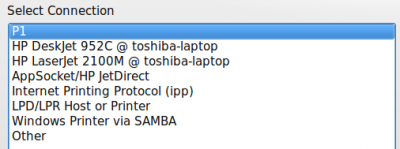Impostazioni di sistema/Stampanti
Printer Configuration
 |
Utilizza questo strumento per collegare il tuo computer ad una stampante e per impostare il necessario |
Elenco delle caratteristiche
- Aggiungere una stampante al tuo computer;
- dare ad ogni stampante un nome che aiuti ad identificarla;
- eseguire prove di stampa e fare manutenzione;
- rimuovere una stampante.

Quando una stampante non è collegata direttamente al tuo computer con un cavo USB, avrai bisogno di utilizzare l'utilità Configurazione stampante per aggiungere la stampante, per esempio quando un altro computer condivide una stampante o vuoi collegarti direttamente a una stampante che è in rete con un server di stampa.
Esempio
Segui i passaggi di questo esempio per aggiungere una stampante collegata in rete al tuo computer. Raccogli le informazioni sulla tua stampante prima di cominciare (produttore, modello, IP, ecc).
Arrivare al programma richiede una sequenza di semplici passi:
- KDE
- Una volta che hai avviato lo strumento , fai clic sul pulsante per aggiungere una stampante (fai clic sul pulsante tra i vari passaggi).
- Il tuo computer cercherà nella tua rete locale stampanti condivise su altri computer o direttamente collegate alla rete.
In this example, I have an HP Laserjet 2100M which is connected directly to my network using a small print server on the printer.
The next illustration also shows that I have another computer sharing two printers on a Toshiba laptop. If I wanted to use either of them, that other computer would need to be on for the printer to work. Remote printers work best if directly connected to the network or are connected to a dedicated print server computer.

- I choose which is the choice for my HP/printserver.

- I enter the IP address number in the Host blank (Currently, the Printer Configuration tool does not identify what that number is, so you will need to ask your network administrator what the IP address is).
- Choose the manufacturer (Mine is HP)
- Choose the model (HP has many)
- Choose the recommended Driver unless you have a reason to do otherwise.
- Give the printer a useful name since "printer" may not be good enough.
- Give a description including the physical location if not in your own room.
- The "Location" defaults to your computer's name in case you decide to share it later. Sharing is one of the options of the printer configuration tool.
On the configuration screen, you will now see a new "Local Printer" because the printer is "attached" to your computer. If you have more than one printer, you should be sure to thoughtfully select one as the default. You might not want to set the big high speed departmental printer/copier in the department manager's office as your default if you have a small printer hooked directly to your computer.


